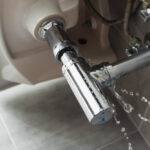In part one of this two-part blog series, we went over some of the possible causes of leaks taking place in your plumbing system. Whether from pipes or some other component within the system, plumbing leaks can lead to everything from rising water bills to water damage, flooding and even mold or mildew formation.
At Action Plumbing, Heating, Air & Electrical, our plumbing services include detailed expertise on plumbing leaks, where they come from and how they can be remedied. In today’s part two, we’ll go over a few other potential culprits in forming leaks, plus how you can prevent and remedy these issues if they crop up, either on your own or with the help of our trusted plumbers.
Pipe Corrosion
Over time, particularly in older homes that have not had their pipe system upgraded in many years, it’s possible for natural elements to lead to rust and other forms of corrosion. This is simply a reality of pipes that pass water through them, especially if you’re dealing with older copper or steel pipes that have high susceptibility to corrosion.
In many cases, this corrosion can lead to the metal wearing down and even forming leaks in several areas. Pipes should be inspected by our plumbers at least once every few years for rust or other signs of damage, or more often if your system is on the older end.
Seal or Joint Issues
In most cases, plumbing fixtures will come with joints with curved corners. However, natural wear-and-tear over the years can cause these joints to loosen, or can create damage within the seal that limits its effectiveness. This can cause water to leak directly from the joints when it flows through this area of the system.
One good way of preventing these risks is to take care of your plumbing system, including avoiding abrupt turn-ons and turn-offs plus not blasting hot water too often. In addition, have your components inspected during routine maintenance appointments.
Water Pressure Concerns
In other situations, a home’s water pressure will force water through the pipes too quickly and with too much force. This pressure will put stress on the joints in your pipes, which can crack and cause leaks. If you’re concerned your pressure is too high, you can purchase a simple test – if your pressure is above 60 psi (pounds per square inch), call our plumbers for a solution, usually a pressure-reducing valve that’s easily installed.
Major Clogs
Finally, drains that are clogged present not only an inconvenience, but also a potential source of new leaks. Clogged pipes will deteriorate much faster than normal ones, especially if water and chemicals are part of the clog. If your clog cannot be remedied with a basic plunger, call our team for professional drain cleaning that will address the problem properly.
For more on identifying the cause of a leak in your plumbing, or to learn about any of our plumbing or heating and air services, speak to the staff at Action Plumbing, Heating, Air & Electrical today.


